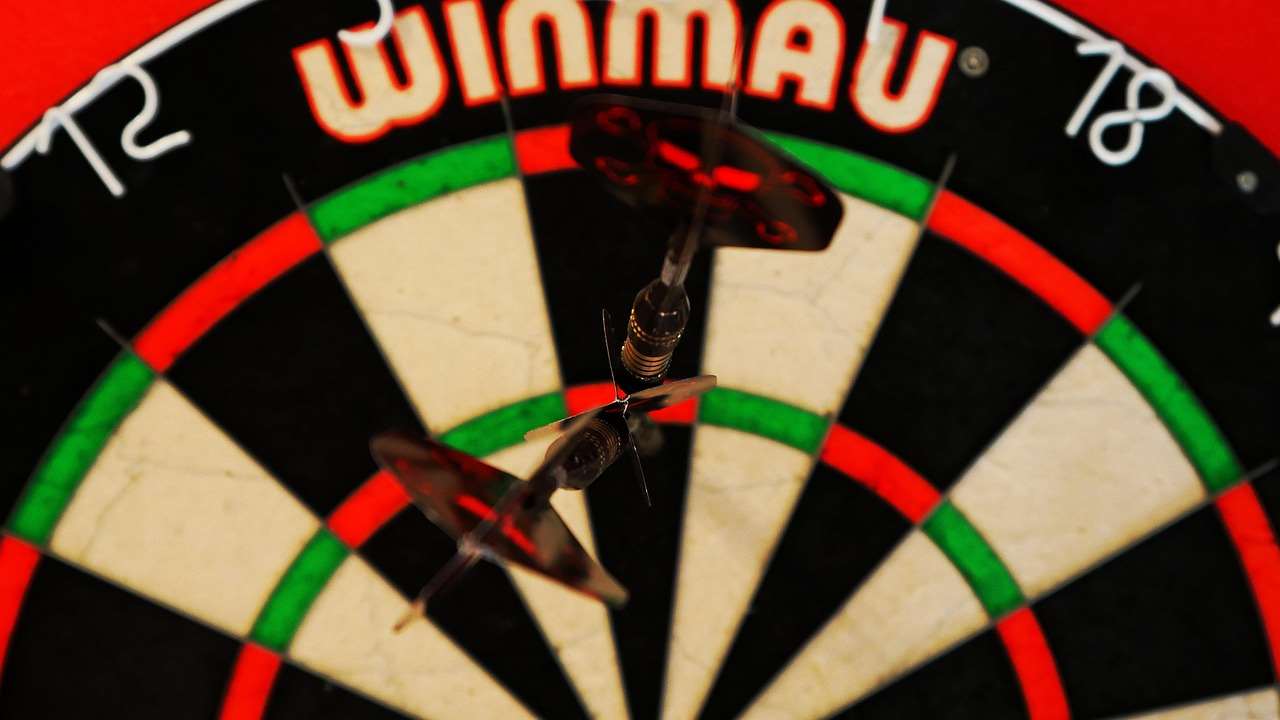Understanding the **legal framework for fantasy darts** is crucial before launching your league to avoid potential pitfalls and ensure smooth operation; this involves knowing the difference between games of skill and chance. This article explores the legality surrounding fantasy darts, covering key regulations and best practices for league administrators.
⚠️ Still Using Pen & Paper (or a Chalkboard)?! ⚠️
Step into the future! The Dart Counter App handles all the scoring, suggests checkouts, and tracks your stats automatically. It's easier than you think!
Try the Smart Dart Counter App FREE!Ready for an upgrade? Click above!
Understanding the Legalities: The Legal Framework Fantasy Darts
Navigating the **legal framework for fantasy darts** requires a careful approach, especially when money is involved. It’s essential to distinguish between a game of skill and a game of chance. Generally, if the outcome relies predominantly on the skill and knowledge of the participants, it’s considered a game of skill. If chance plays a significant role, it could be classified as gambling, which is subject to more stringent regulations. For example, you can delve deeper into the impact of Impact Betting Sponsorship Darts and how this plays into the legality aspect.

In most jurisdictions, games of skill are treated more leniently than games of chance. However, this doesn’t mean they’re entirely unregulated. Many regions have laws regarding advertising, data protection, and consumer protection that apply to all types of competitions, including fantasy darts. It’s critical to research the specific regulations in your area to ensure compliance.
Key Elements Determining Legality
- Skill vs. Chance: Is success primarily based on the participants’ understanding of darts, player statistics, and strategic decision-making, or is it largely determined by random factors?
- Prize Structure: How are prizes awarded? Are they fixed amounts, or are they based on entry fees collected? The way prizes are structured can influence whether a game is viewed as gambling.
- Entry Fees: Are entry fees required to participate? If so, this can be a significant factor in determining whether the activity is considered gambling.
- Advertising and Promotion: Are the games marketed responsibly and transparently, without misleading claims or targeting vulnerable individuals?
Defining Fantasy Darts and Its Elements
Before diving deeper into the legal aspects, let’s clearly define what constitutes “fantasy darts.” In essence, it involves participants creating virtual teams of professional darts players and earning points based on those players’ real-world performance. These leagues often involve entry fees and prize pools, raising questions about their legality.
The core elements of fantasy darts typically include:
- Drafting: Participants select their teams of darts players.
- Scoring: Points are awarded based on player performance in actual tournaments (e.g., points for 180s, checkout percentages, wins).
- Management: Participants may be able to make trades, substitutions, or other strategic adjustments to their teams.
- Prizes: Winners of the league or specific contests receive prizes, which can be cash, merchandise, or other rewards. Learn more about how Bookmaker Sponsorship Professional Darts impacts the professional side of the game.

These elements, especially the presence of entry fees and prizes, are the aspects that scrutiny falls upon when considering the legal framework fantasy darts.
Navigating Prize Structures and Entry Fees
The way you structure your prizes and entry fees is crucial for staying on the right side of the law. Here are some key considerations:
- Transparency: Be upfront about how entry fees are used and how prizes are calculated. Clear and concise rules are essential.
- Prize Pool Distribution: Consider distributing a portion of the entry fees to cover administrative costs, rather than awarding the entire amount as prizes. This can help demonstrate that the primary purpose is not gambling.
- Skill-Based Prizes: Offer prizes that are related to darts or sports in general (e.g., darts equipment, tickets to events). This can reinforce the skill-based nature of the competition.
- Free-to-Play Options: Offer a free-to-play version of your fantasy darts league. This can demonstrate that you are not solely focused on generating revenue through gambling.
Consider legal counsel to review the prize structure; this is very important if large sums of money are involved.
Data Privacy and Protection
Running a fantasy darts league involves collecting and processing personal data from participants, making data privacy a critical legal consideration. Compliance with data protection laws, such as GDPR (General Data Protection Regulation) in Europe and similar regulations in other jurisdictions, is essential.
Key Data Privacy Requirements
- Consent: Obtain explicit consent from participants before collecting their personal data. Explain clearly how their data will be used.
- Data Security: Implement appropriate security measures to protect participants’ data from unauthorized access, use, or disclosure.
- Data Minimization: Collect only the data that is necessary for the operation of the league. Avoid collecting excessive or irrelevant information.
- Transparency: Provide participants with a clear and accessible privacy policy that explains your data processing practices.
- Data Subject Rights: Respect participants’ rights to access, correct, and delete their personal data.

Failing to comply with data privacy laws can result in significant fines and reputational damage. Therefore, you can see why understanding the **legal framework fantasy darts** is an advantage.
Advertising and Marketing Regulations
How you advertise and market your fantasy darts league is another important legal consideration. Many jurisdictions have regulations regarding advertising, particularly concerning gambling-related activities. Avoid making misleading claims or targeting vulnerable individuals, such as minors or those with gambling problems. The increase in popularity and exposure through media coverage means responsible marketing is key, as explained further in Betting Sponsorship Media Coverage.
Here are some tips for responsible advertising:
- Be Truthful: Avoid exaggerating the potential for winnings or making unrealistic promises.
- Target Responsibly: Don’t target minors or individuals with gambling problems.
- Include Disclaimers: Clearly state that participation involves risk and that there is no guarantee of winning.
- Promote Responsible Gaming: Provide information about responsible gaming and resources for those who may have gambling problems.
Staying compliant with advertising standards is crucial for the sustainability of your fantasy league.

Terms and Conditions: Protecting Yourself and Your Participants
Having a well-drafted set of terms and conditions is essential for protecting yourself and your participants. The terms and conditions should clearly outline the rules of the league, the rights and responsibilities of both the organizers and the participants, and the procedures for resolving disputes.
Key elements to include in your terms and conditions:
- Eligibility: Who is eligible to participate in the league? (e.g., age restrictions, residency requirements)
- Rules: A clear and detailed explanation of the rules of the league, including scoring, drafting, trading, and other relevant aspects.
- Prizes: Information about the prizes that will be awarded, including the value, how they will be awarded, and any restrictions or conditions.
- Liability: A disclaimer of liability for any losses or damages incurred by participants.
- Dispute Resolution: Procedures for resolving disputes, such as arbitration or mediation.
- Termination: The conditions under which the league can be terminated or suspended.
- Privacy Policy: A link to your privacy policy.

Make sure participants read and agree to the terms and conditions before joining the league. This can be done by requiring them to check a box indicating that they have read and understood the terms. You should also consider the increasing visibility of Darts Betting And Fantasy Leagues Guide and integrate fair practices.
Seeking Legal Advice
The legal landscape surrounding fantasy sports, including fantasy darts, is constantly evolving. It is always a good idea to seek professional legal advice to ensure that your league is compliant with all applicable laws and regulations. This is especially important if you are operating in multiple jurisdictions or if you are offering large prizes.
Here are some situations where seeking legal advice is particularly important:
- Operating in Multiple Jurisdictions: If your league operates in multiple states or countries, you will need to comply with the laws of each jurisdiction.
- Offering Large Prizes: If you are offering large prizes, the scrutiny from regulators is likely to be higher.
- Significant Revenue: If your league is generating significant revenue, it is more likely to attract the attention of regulators.
- Uncertainty about the Law: If you are unsure about the legality of your league, it is always best to err on the side of caution and seek legal advice.
Remember, proactive legal consultation is an investment in the long-term success and sustainability of your fantasy darts venture. Understanding the nuances of **legal framework fantasy darts** is paramount to its success. Furthermore, the rise in awareness of Betting Company Logos Player Shirts highlights the need for transparency and compliance.
Conclusion
Successfully navigating the **legal framework for fantasy darts** requires a proactive and informed approach. Understanding the distinctions between skill and chance, carefully structuring your prize pools, prioritizing data privacy, adhering to advertising regulations, and establishing comprehensive terms and conditions are all essential steps. While this overview provides valuable guidance, seeking professional legal advice specific to your jurisdiction is highly recommended. By prioritizing compliance and ethical practices, you can create a thriving and sustainable fantasy darts league. Start building your league today, confident that you’re operating within the bounds of the law!
Hi, I’m Dieter, and I created Dartcounter (Dartcounterapp.com). My motivation wasn’t being a darts expert – quite the opposite! When I first started playing, I loved the game but found keeping accurate scores and tracking stats difficult and distracting.
I figured I couldn’t be the only one struggling with this. So, I decided to build a solution: an easy-to-use application that everyone, no matter their experience level, could use to manage scoring effortlessly.
My goal for Dartcounter was simple: let the app handle the numbers – the scoring, the averages, the stats, even checkout suggestions – so players could focus purely on their throw and enjoying the game. It began as a way to solve my own beginner’s problem, and I’m thrilled it has grown into a helpful tool for the wider darts community.